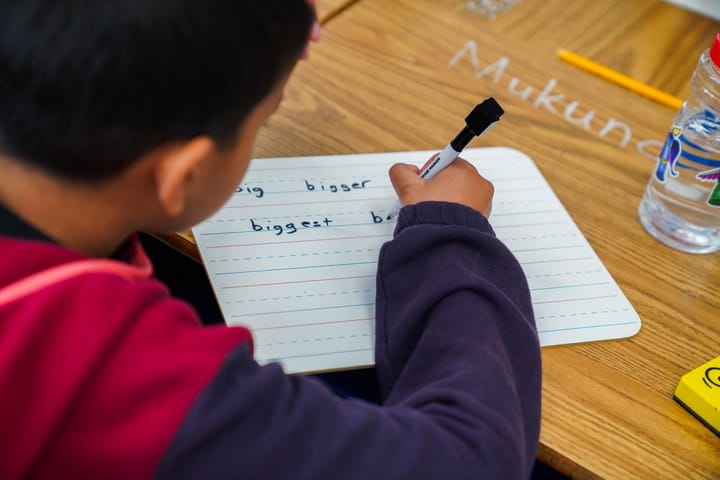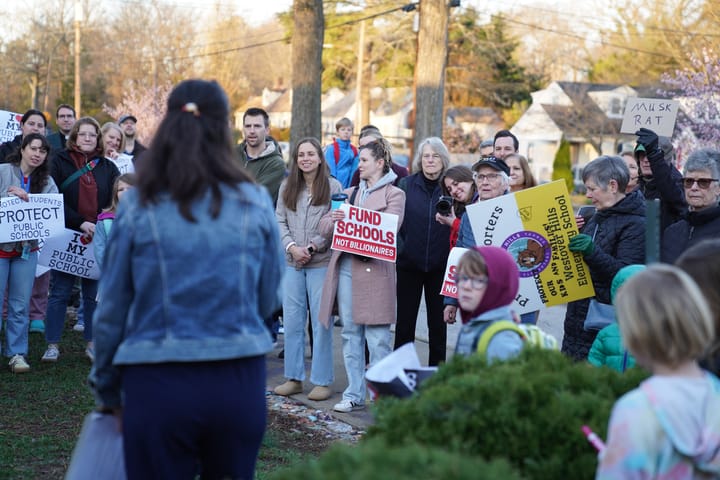
Richmond Public Schools is revamping its fundraising arm. Will the gamble pay off?
Richmond Public Schools’ nonprofit fundraising arm is overhauling how it operates — and so far, the revamp seems to be yielding big bucks.
Since 2001, the Richmond Public Schools Education Foundation has existed for the purpose of raising money to supplement the public funds the division gets.
The results have been limited. During the organization’s first 10 years of existence, annual fundraising sometimes didn’t exceed $10,000. Over the past decade, tax filings have shown about $1 million a year in contributions.
That picture is changing. In the first four months of this fiscal year, the foundation took in roughly $3.4 million. And Taikein Cooper, who took over the executive director role in February 2023, told the School Board this October that he’s hopeful the organization can hit $5 million by June 30.
The fundraising hikes are part of a major overhaul Cooper is spearheading at RPSEF that aims to reconceive the foundation’s role in supporting Richmond Public Schools and how it pitches itself to donors.
Previously, Cooper told the School Board, the pitch was “kind of: ‘Woe is me.’ It was, you know, ‘Richmond Public Schools, we serve Black and brown kids; you should give us money because it’s the right thing to do.’”
That, he says, wasn’t effective.
“People give gifts and make donations and give contributions for charity,” he said. “But they make investments for impact.”
With that in mind, the foundation is retooling itself as a big-dollar fundraiser that can help Richmond schools tackle the big-picture issues they’re facing. It’s rebranding itself as the Richmond Ed Fund, has crafted its first strategic plan in 10 years and is aggressively courting major donors to put their money toward division initiatives that have the potential to improve educational outcomes.
The message the foundation wants to convey, Cooper told The Richmonder, is that “this is a place where we’re trying new and innovative things that not only can transform RPS, but also have the opportunity to be scalable.”
Among the early responders are Bloomberg Philanthropies, which this June announced it would put $2.5 million toward an expansion of RPS200, a pilot program that extends the calendar in select Richmond schools from 180 to 200 days and has shown significant literacy gains. Money also came from the Schusterman Family Philanthropies for literacy work across the division.
“We’ve worked really hard over the last few years to grow into an organization that can think and act divisionwide and not kind of get caught up in the day to day of RPS, but rather be focused on recruiting the kinds of resources into the division that will make broad systemic change,” said Dave Mills, chair of the foundation’s board of trustees and a parent of two RPS students.
‘Moving the needle’
The latest overhaul of the RPS Education Foundation (not to be confused with the separate Richmond Education Foundation that more than a decade ago unsuccessfully pushed for a new charter middle school) has been several years in the works. The pivot began around the time Superintendent Jason Kamras was hired to lead the division and pushed forward by some soul-searching during the pandemic.
“There was a little bit of time we were figuring out who we were,” said Cooper.
Throughout its history, the foundation has tried out an array of approaches to helping the school system. It has provided scholarships to graduating seniors, which in recent years have topped out at $1,500, and paid for resources like books, musical instruments and field trips. During the pandemic, its support helped pay for Chromebooks for students forced to attend school virtually.
“It was doing good work that was often providing smaller grants to schools, even in some cases to individual classrooms and serving as a fill in, a place where someone could put some money and know it would go to a good thing in RPS schools,” said Thad Williamson, a University of Richmond professor who is vice chair of the foundation’s board of trustees.
In 2015, under the leadership of Adele Johnson, the foundation threw its weight behind the development of a program known as the RVA Future Centers, which act as hubs in the city’s high schools where students can access resources and services to prepare for life after graduation.
That remained one of the organization’s major focuses until 2020, when the school division took over management of the program. By then, the foundation was already considering where it could make the biggest impact and how it could align with the strategic goals of the division, which came to be enshrined in the Dreams4RPS plan.
“Oftentimes we’ve gotten distracted by what I call feel-good projects,” said Cooper. “Those things are really important, but I don’t think they were moving the needle districtwide.”
He struck a similar note in explaining to the School Board this October why the foundation is halting its scholarship program.
“We have a limited amount of resources and capacity, and we have to prioritize what I like to think are catalytic investments,” he said. “And not to be crass, but y’all know me, I’m pretty candid: $1,500 isn’t moving the needle anymore. And that’s our largest scholarship at this time.”
Still, Williamson said the foundation will still be available to step in during crises, as it did after the June 2023 Huguenot High School graduation shooting. In the tragedy’s wake, the foundation set up a Trauma Response and Healing Fund that it says has assisted 6,000 families.
“There will always be a need for things where something immediate needs to happen,” he said. “I don’t see the foundation getting out of that altogether.”
Impact Lab
Although the RPS Education Foundation is moving away from directly running programs like the RVA Future Centers, its involvement won’t be limited to fundraising. The organization is also launching the Impact Lab, an umbrella for a variety of initiatives aimed at spurring “transformation change” in the division that will be operated by third-party providers.
Among the first set of projects planned for the Impact Lab are a principal residency program to provide professional development to principals and assistant principals, a paid internship program for RPS students and a guaranteed income pilot for students that would build upon the city’s earlier family-based pilot.
“It’s difficult for the district to use public dollars on new ideas that may not be proven yet,” said Cooper. But the foundation has “more flexibility to try some stuff.”
For Mills, “It’s about bringing all these different pieces, whether they be resources or talent or goodwill, from all over the city and bringing them to the table.”
“There are big, historic resources and programs and efforts being made to improve the day-to-day lives of our students, to help them be successful, to help our teachers,” he said. “I know how sort of daunting it can be at times. But I’ve never been more optimistic than I am today about the direction of RPS.”






